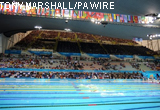 Working so closely to the athletes, you learn and see things that never appear on the TV screen. Tension must be a problem – these people have worked as long and harder than any doctor did for a professional examination, and we know how tense that can make you on the day.
Working so closely to the athletes, you learn and see things that never appear on the TV screen. Tension must be a problem – these people have worked as long and harder than any doctor did for a professional examination, and we know how tense that can make you on the day.
Moreover, that tension is expressed in their bodies, when they need them to be a loose and supple as possible, not a problem in the examination room. Our emergency medical room is immediately next to the ‘Final Call Room” where the competitors are assembled before they go out on to poolside.
They wait, despite the 28 degrees of heat, wrapped in tracksuits and puffa jackets, some wrapped in the comfort of earphones to exclude outside noise. But as their moment, and even a five minute race is a moment in the years of preparation, nears, they need other tension relief to keep the muscles moving.
And they slap themselves, really hard! On their legs, arms, buttocks and pectorals, all the big muscle groups they ae about to be used to a level unbelievable to ordinary mortals. The sound fills the Call Room and our room, jerking any dozy medic awake.
The male swimmers in particular, often with such muscular shoulder development as to be V-shaped, may slap themselves so hard on their chest that they give themselves wheals. Look out for them on the starting line. That is not a pair of wings tattooed on that swimmers chest, it is the marks of his hands, slapping himself to keep loose for the race.
John Davies is a consultant anaesthetist in Lancaster, who takes part in motorsport as a competitor and as a rally doctor. He is volunteering as part of the Olympic games medical team in the aquatic centre. Over the next couple of weeks he will be blogging from the Olympic Park about his experience during the Olympic games.
